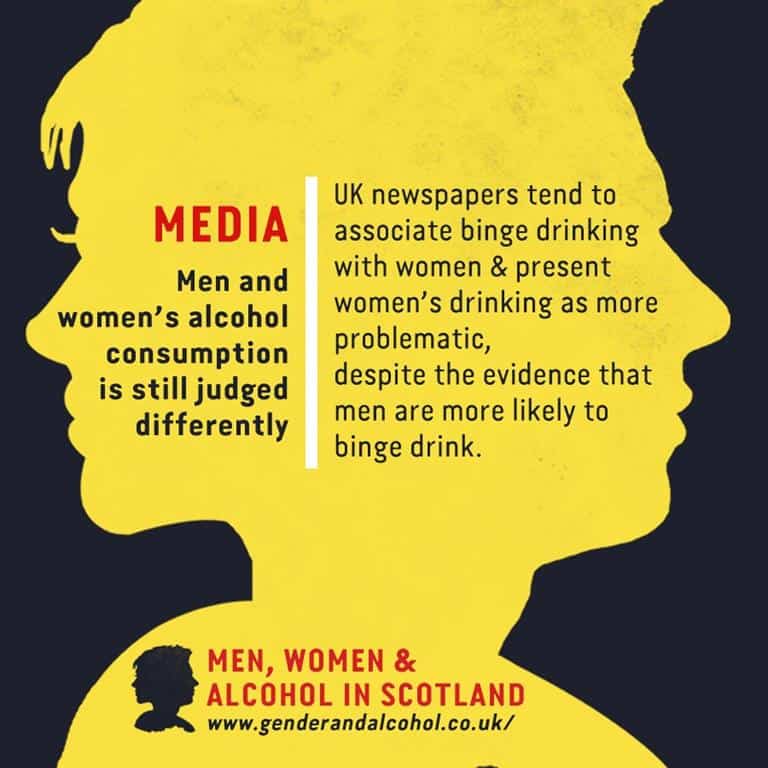The stigmatisation of women’s drinking, and the sexualisation of women in alcohol advertising, was highlighted at an event held in the Scottish Parliament by policymakers, academics, researchers and politicians.
The report Women and Alcohol: Key Issues launched by Scottish Health Action on Alcohol Problems (SHAAP) and the Institute of Alcohol Studies (IAS) addresses some of the challenges faced by women in relation to alcohol.
Recommendations include: better collaboration between researchers, practitioners, women’s rights groups, and those with lived experience of alcohol harm; restrictions put in place for all forms of alcohol marketing, including online, which employ sexualised images and messaging relating to women; more women-only spaces in alcohol services, and more residential treatment and recovery support for women and children.

The portrayal of gender stereotypes in the media |
Alex Cole-Hamilton MSP, who sponsored the event at the parliament’s buildings, said: ‘I am really pleased to sponsor this event at Parliament, in our nation’s struggle with alcohol we have seen many myths linked to drinking habits and gender. If we are to tailor an effective national policy response we need to be clear about the facts and in particular challenge preconceptions. As research findings show, there are strong stereotypes embedded in our social consciousness, and our first challenge is to unpick these.’
The report draws on findings from a series of consultation events held in Edinburgh and London in 2017 about the relationships between alcohol and women, including the stigmatising of certain women’s drinking behaviours and the motivations and behaviours of alcohol producers.
It also follows research from Glasgow Caledonian University (GCU) and the University of Stirling in 2016 that found ‘gender is poorly reported in systematic reviews of population-level interventions to reduce alcohol-related harm, hindering assessment of the intended and unintended effects of such policies on women and men.’
Supporting the event, Dr Carol Emslie (Glasgow Caledonian University) and Dr Niamh Fitzgerald (University of Stirling) will also present a new Infographics on Men, Women and Alcohol in Scotland series (illustrated), intended to challenge stereotypes and stigmatising attitudes about gender and drinking.
Dr Carol Emslie – seen here talking about the report – said: ‘Women are still judged more harshly than men if they have been drinking and media reports continue to highlight young women as a group prone to ‘risky’ drinking. Our infographics ask people to question why stereotypes about gender and alcohol persist. Watch out for ‘bench girl’, an image often used to accompany any story on alcohol, showing a young woman in a black dress and boots, sprawled apparently semi-conscious on a street bench. Yet official statistics demonstrate older men make up the majority of those who die or are hospitalised for alcohol-related causes.’
Report authors Victoria Troy and Dr Eric Carlin, both of SHAAP, said:
Although men are about twice as likely as women to die from alcohol-related causes, media discussion often focuses on the perceived problem of women’s drinking, with moralistic and stigmatising attitudes featuring strongly in public discussions. We’ve been trying to explore why this happens and to suggest how we can counter cynical marketing by alcohol producers that exploit rather than emancipate women, as well as suggesting how support services can be more women-friendly.
The Institute of Alcohol Studies chief executive Katherine Brown gave an address identifiying the contradictions in alcohol marketers selling women alcohol as empowering while at the same time using highly sexualised and submissive images of women to sell alcohol to men.
She said of the Women and Alcohol series: ‘Some of the findings from these seminars were really worrying. The sexualisation of women in alcohol marketing may be working to undermine gender equality and ultimately de-sensitise public attitudes towards domestic abuse and sexual assault. We need to see an end to such practices and learn from other countries such as France which restrict alcohol advertising to protect against adverse outcomes.’
